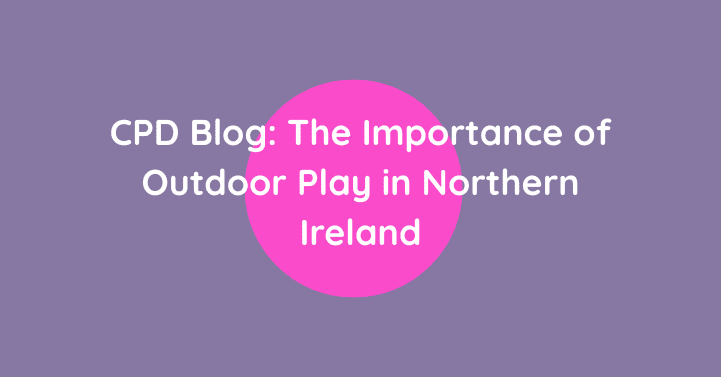The Importance of Outdoor Play in Northern Ireland
A Research-Informed Guide for Educators
Aligned with the Northern Ireland Curriculum & EA Guidance
1. Why Outdoor Play Matters in Northern Ireland
Outdoor play is a core expectation within the Northern Ireland Curriculum and Foundation Stage statutory guidance.
The curriculum emphasises that learning should be:
-
play-based
-
active
-
meaningful
-
inquiry-led
-
connected to children’s lives and interests
Outdoor learning perfectly supports these principles by offering rich, hands-on, open-ended experiences that promote independence, wellbeing and deeper learning.
Northern Ireland’s Education Authority (EA) and the Council for the Curriculum, Examinations and Assessment (CCEA) strongly encourage outdoor learning across early years and primary settings.
2. Research That Supports Outdoor Play
1. Improved Cognitive Development & Thinking Skills
Outdoor environments promote problem-solving, curiosity and higher-order thinking.
Evidence: Rickinson et al. (2004); Fjørtoft (2001)
2. Increased Physical Activity & Motor Skills
Outdoor play supports whole-body movement, coordination and confidence.
Evidence: Brussoni et al. (2015); Tandon et al. (2018)
3. Enhanced Wellbeing & Emotional Regulation
Nature supports calmness, reduces stress and helps children feel grounded.
Evidence: Wells & Evans (2003); Kelz et al. (2013)
4. Stronger Social Development
Play outdoors encourages teamwork, turn-taking, negotiation and independence.
Evidence: Sandseter & Sando (2016)
5. Deeper Curriculum Learning
Outdoor experiences strengthen understanding and long-term memory.
Evidence: Rickinson et al. (2004)
3. Outdoor Play and the Northern Ireland Curriculum
Outdoor learning can support all Areas of Learning, including:
Foundation Stage (P1 & P2)
Outdoor play links strongly with:
-
Personal Development & Mutual Understanding (PDMU)
-
Physical Development & Movement
-
The World Around Us
-
Language & Literacy
-
Early Mathematical Experiences
-
The Arts
Key Stage 1 & 2
Outdoor learning enhances:
-
Thinking Skills & Personal Capabilities (TSPC)
-
Cross-curricular thematic learning
-
STEM investigations
-
Literacy and numeracy across contexts
-
PDMU and wellbeing activities
-
Environmental awareness and sustainability themes
Outdoor learning directly supports the curriculum focus on active, practical, and enquiry-based learning.
4. Outdoor Play and SEND/SEMH in Northern Ireland
Outdoor spaces offer significant benefits for children with:
-
ASD
-
ADHD
-
Sensory processing differences
-
Social, emotional and mental health needs
-
Speech, language and communication difficulties
-
Physical disabilities
-
Trauma or high stress
Why the outdoors works for SEND:
-
Less sensory overload
-
Fewer social pressures
-
More movement opportunities
-
Clearer boundaries
-
Natural sensory input for regulation
-
Hands-on learning that doesn’t rely on written work
-
Reduced behavioural triggers
-
Greater freedom, independence and choice
Evidence: Änggård (2011); Barrable (2019)
Outdoor learning aligns with NI’s emphasis on inclusion, early intervention and nurturing practice.
5. Example Outdoor Play Opportunities in Northern Ireland Settings
Foundation Stage
-
Mud kitchens
-
Water play outdoors
-
Puddle investigation
-
Stick or stone counting
-
Outdoor mark-making
-
Role-play in natural spaces
KS1–KS2
-
Maths trails
-
Living things and habitats investigations
-
Forces and materials experiments
-
Outdoor reading and storytelling
-
Mapping and orienteering
-
Art in nature using clay, leaves and bark
PDMU & Wellbeing
-
Nature walks
-
Team-building tasks
-
Outdoor mindfulness
-
Regulation routes and sensory paths
6. The Muddy Puddle Teacher® Toolkit for Northern Ireland
Our Toolkit aligns strongly with NI priorities for:
-
play-based pedagogy
-
active learning
-
outdoor exploration
-
creativity and problem solving
-
inclusion and differentiation
-
sustainability and upcycling
Toolkit Methods
1. Bamboo Method
Shape-making, measurement, angles, boundaries and STEM structure.
2. Rope Method
Science investigations, team tasks, games, problem solving, movement pathways.
3. Clay Method
Art, modelling, sensory regulation, literacy characters, science concepts.
4. Stick & Stone Method
Sorting, counting, phonics, patterns, mini-construction and storytelling.
5. Puddle Play Method
Science inquiry, language development, prediction and observation.
6. Loose Parts & Upcycled Method
Engineering challenges, creative construction, teamwork and imaginative play.
These methods work in any setting — from rural schools to concrete playgrounds.
7. Reflection Questions for Northern Ireland Practitioners
-
How does outdoor play feature in our current planning?
-
Which Areas of Learning could we strengthen outdoors?
-
Which children benefit most from outdoor experiences?
-
What barriers stop us using the outdoors more frequently?
-
How could we use the Muddy Puddle Teacher® Toolkit to support inclusion?
-
How can outdoor play help us meet TSPC and cross-curricular links?
8. Next Steps for NI Schools & Early Years Settings
Strengthen your outdoor teaching practice with:
-
The Muddy Puddle Teacher® Level 1–4 Programme
-
SEND & SEMH outdoor modules
-
Curriculum-based outdoor learning training
-
Whole-school outdoor pedagogy INSET days
-
Free demonstrations on TikTok, Instagram and Facebook
For training, bookings, or more information:
info@themuddypuddleteacher.co.uk


